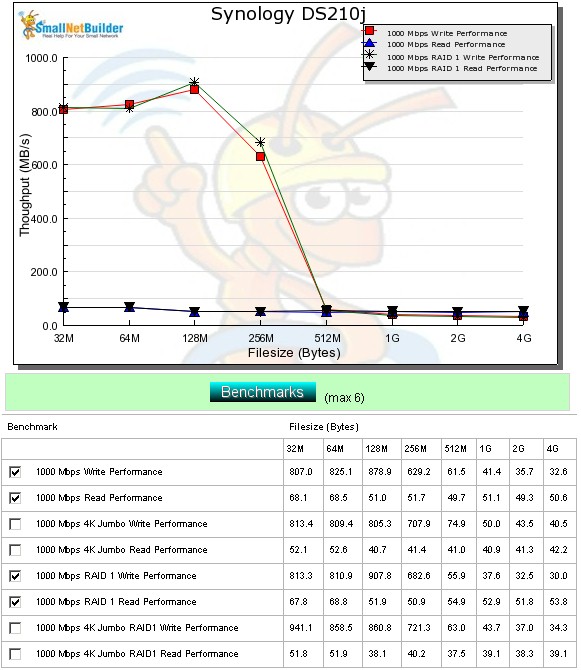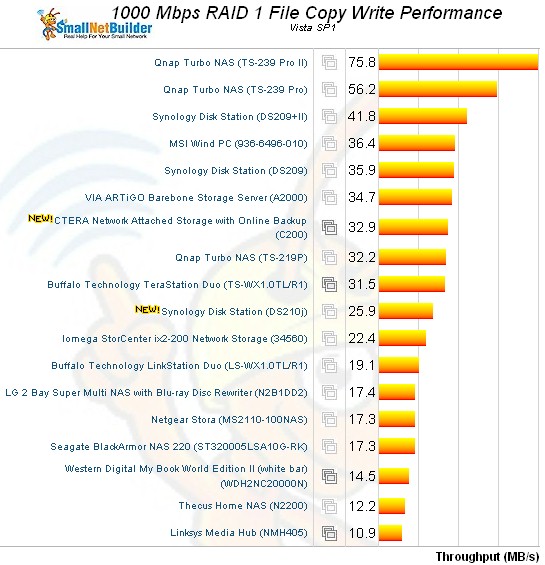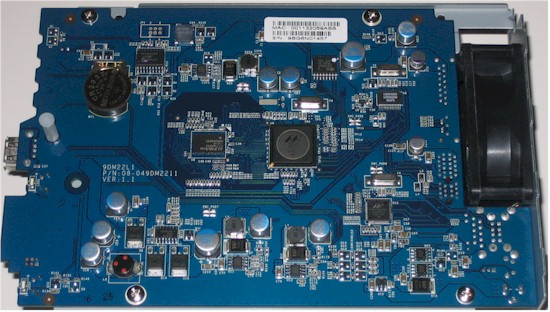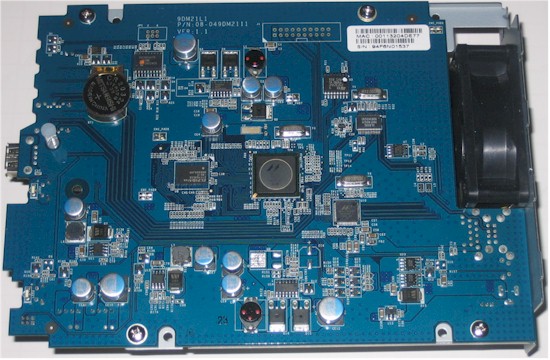The Synology DS210j has been added to the NAS Charts.
The 210j is Synology’s least expensive dual-bay NAS. It takes the same approach as the DS110j, which posted to the NAS Charts a few weeks ago, but copies the DS209 (vs. the DS109) with a slower processor.
The hardware platform is based around a Marvell 88F6281 Kirkwood SoC clocked at 800 MHz with 128 MB of RAM. Other components include 4 MB of flash, Genesys Logic GL850G USB Hub 2.0 controller, Marvell 88E116R Gigabit Ethernet controller and Microchip PIC16F627 CMOS FLASH-based 8-bit microcontroller.
Figure 1: Synology DS210j board
A comparison of the DS210j (Figure 1) and DS209 (Figure 2) boards reveals that they are not the same board (note the different board numbers at the mid-left above and top left below). But the designs are basically the same, except for the different speed Kirkwood processors.
Figure 2: Synology DS209 board
The 210j came with two Seagate ST31000528AS Barracuda 7200.12 1 TB drives installed, which yielded a total power consumption of 21W with the drive spinning and 10 W with it spun down via the programmable power save feature. The single fan was nice and quiet, so the 210j’s noise level rating is "very low".
Like all Synology NASes, the 210j supports Synology’s the entire DSM 2.3 OS feature set. Backup options include USB, rsync targets and Amazon S3 and there are plenty of media serving options including iPhone/Mobile access, Photo web server and UPnP / DLNA support.
Tests were run with DSM 2.3-1157 firmware using our standard test process. Write performance using iozone with a Gigabit LAN connection showed very high write caching speeds. For file sizes 512 MB and up, writes drifted down from 62 and 56 MB/s to 33 and 30 MB/s for RAID 0 and 1, respectively. Read speeds were steady in the low 50 MB/s range for both RAID 0 and 1.

Figure 3: DS210j throughput vs. file size
Average RAID 1 write performance using a Gigabit Ethernet connection measured 39 MB/s for file sizes between 32 MB and 4 GB, with cached behavior not included in the average calculation. Average read performance was significantly higher, measuring 56.6 MB/s. This ranks the 210j below both the DS209 and DS209+ for write and read.
As with the DS110j, RAID 1 write file copy performance using our Vista SP1-based test showed the price paid for using the slower Kirkwood SoC. Figure 4 shows the 210j providing just shy of 26 MB/s while the more expensive DS209 came in at 36 MB/s. RAID 1 Read file copy rankings again placed the DS209 and 209+II in the 70 MB/s range significantly above the DS210j at 53 MB/s.

Figure 4: DS210j file copy performance – write
I also tested backup to an attached USB drive and speeds measured 16.9, 23.6 and 6.3 MB/s for FAT, EXT3 and NTFS, respectively. Network backup to a QNAP TS-239 Pro II rsync target measured 15.5 MB/s, essentially the same as the DS110j. Finally, write and read speed to a 10 GB iSCSI target measured 27.3 MB/s and 30.5 MB/s.
Synology’s feature set has been already covered in other reviews, so there won’t be a full review. Use the NAS Charts to further explore the DS210j’s performance and compare it to other products.


